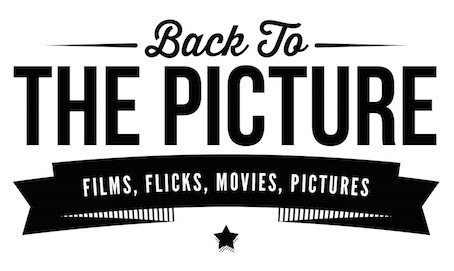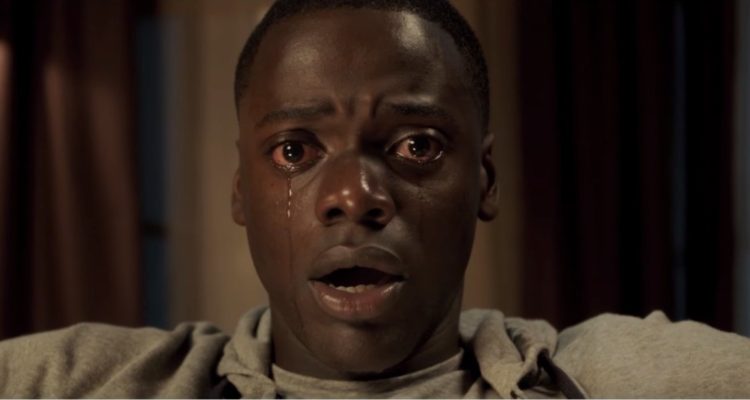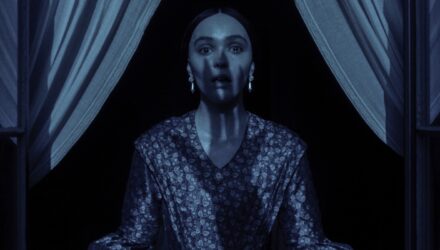Is it too soon to start making predictions for next years Oscars? Cuz if not, I think I have a film that needs to be put into consideration.
Get Out’s premise is simple: Rose Armitage (Allison Williams) and Chris Washington (Daniel Kaluuya), an interracial couple head over heels for one another, are heading to Rose’s parent’s house for a weekend getaway. As they set out to what is essentially the middle of nowhere, Chris asks one simple yet extremely relevant and important question: “Do they know I’m black?” This quick line brings us headfirst into what slowly becomes a nightmarish trip for Chris, where thinly veiled racism gives way to a full-blown conspiracy with a few twist thrown in for good measure that are both equal parts uncomfortable as they are horrifying. As the walls seemingly start to close in on our protagonist, Chris begins to question what’s going on around him, but by the time he figures out what’s really happening, he may be too late to help himself, or worse, physically and mentally unable to do so at all.
I don’t know if it’s just me, but it feels like the idea of filmmaking as a form of social commentary has sort of died down in recent years – or at least on a mainstream level – as audiences gravitate towards the next superhero flick to entertain and escape into. Enter Jordan Peele, one half of the hit comedy duo Key and Peele and first time director, who makes turning a well-trodden genre on its head look easy. Taking on the very real issue of racism in this country, Peele expertly devises a simple story framed in a way that makes the “scares” of the film as unconventional as his take on the subject matter itself. While there’s a few jump scares here and there, Peele skillfully finds a way to make everyday occurrences in a black man’s life feel like something ripped straight out of a Stephen King novel.
Not once did I feel “safe” while watching this film, nor was I anything but uncomfortable during the entire runtime, which, for most films coming out nowadays would be a negative, but for Get Out, it couldn’t be more of a compliment. It says something about Peele’s strong vision for a story like this that shows how truly outstanding a film can become when enough attention is paid to subvert what viewers think they’re going to see instead of just finding new ways to show the same old shit. It’s in situations like this when filmmakers find different ways to buck the tropes and clichés of their genre of choice and aren’t afraid to mix in a few things that might never be found in a film like this i.e. the comedy aspect of it all and the social relevance of Peele’s message, but it’s good to know that there are still some people thinking outside of the box and trying to find unique ways to express their opinion on serious matters.
For example, throughout the film we see what Daniel Kaluuya’s character is facing being the only black man in a group of closeted racists, an angle that isn’t necessarily new to the film world, but from a horror standpoint, it’s positively brilliant. Peele could have very easily made a drama about such a subject matter, a real tour de force of what it’s like to be in a black man’s shoes for a day, but as with everything he’s done up to this point in his career, he chooses the road less traveled and makes something truly unique, and quite frankly, inspiring by framing his thoughts through the lens of a horror film. It’s these types of choices that elevates Get Out to something that we don’t see anymore in Hollywood: a true classic in every sense of the word that will no doubt stand the test of time when looked back on, if not only for it’s relevance but also it’s successful take on the horror genre itself.
Speaking to the more technical side of Get Out, Peele expertly crafts the visuals of this film with a touch of absurd, dream-like qualities that add to the overarching feel of this film. When the hypnotism angle begins to pull the story in a different direction, the cinematography and “dream” sequences keep up with the abundance of creepy effects and shots that do more than unsettle, they bring you into Chris’ mind as he’s being toyed with and as he slowly begins to figure out the true horrors going on around him. Depicting the inner thoughts and feelings of a person in this situation is where a lot of the film’s burden lies, but Kaluuya’s portrayal of Chris is spot on in a way that makes me feel even more so for his character and the injustices he faces throughout the story. I wouldn’t be surprised if and (hopefully) when Peele ventures into other directing projects that he brings Kaluuya along with him akin to the muse/artist relationship many directors have with repeat actors.
Get Out is a rare achievement not only for the horror genre, but also for filmmaking in general. Jordan Peele somehow manages to fuse his signature wit and humor with spot on social commentary in the form of hair-raising scares and uncomfortable scenarios that are no doubt ripped from his own life and the lives of other African Americans across the country. I will never know what African Americans go through on a daily basis, but experiencing this film in all of its raw and unfiltered glory allows me to at least recognize less than a fraction of what they go through, while at the same time allowing us as audience members to ponder what this movie is trying to say as we walk out of the theater. It’s a film that deftly allows itself to work as a coherent, enjoyable and frightening experience while at the same time helping to start a dialogue about what racism is doing to everyday people, and how scary it can truly become when no one is looking.
9.1
Get In On This
The Verdict
9.1





